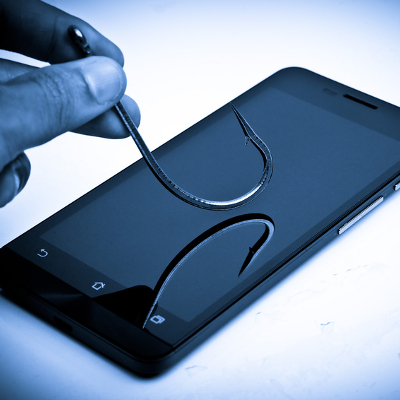How To Spot A SMiShing Attempt

Phishing–it’s a threat that tells a tantalizing lie to entrap its target, and one that you’ve likely heard of before. However, as technology has advanced, so have the opportunities that cybercriminals have to leverage phishing attempts. Smartphones, for instance, make it so that you must be aware and on the lookout for SMiShing scams.
SMiShing?
SMiShing is the mobile version of phishing. Instead of catching the target with an email message, SMiShing attempts are sent via SMS, or text. Other than the method of introduction, there is little difference between SMiShing and the traditional phishing. For instance, both require the target to take the phisher (or, in the case of SMiShing, ‘smisher’) at their word and comply with any instructions.
Despite the general public learning to be more wary of cyber threats that come through the computer, there is still a lack of anticipation that these threats can also come in via cell phone. SMiShing is meant to use the disguise of a familiar contact to steal credentials and data, or delete it entirely.
A “smisher” will use any stolen credentials to access the user’s accounts and cause all sorts of chaos for them. For example, if you have any sensitive client information located on-site or stored in an online account, hackers can gain access to it with your credentials. Another way that a smisher might take advantage of you is by sending you a fake link via an SMS and request that you authenticate yourself or face a recurring fee. If this is the case, you should report the attempt to IT and give the smisher no response.
Spotting a SMiShing Scam
The first thing you should do if you receive a message that you suspect is part of a SMiShing attempt is to reach out to the supposed sender to confirm that it was legitimate. This should be done via some means other than text. Calling the contact or one of their representatives can help you to judge if the message is authentic or not without leaving yourself vulnerable to further threats.
It more or less boils down to leaving SMS messages from unknown senders alone. This is especially true of ‘5000’ numbers, which indicate that the message was originally an email sent as a text. Scammers have been known to use this tactic in their schemes.
Furthermore, messages with downloadable applications are another warning sign, as this is a common method of infecting a mobile device with malware. A good rule of thumb is to only download and utilize apps that come from your mobile device’s official marketplace, as those that don’t are very likely to turn out to be malware in disguise.
How To Protect Yourself
As mentioned above, if there is any doubt about the validity of a message, confirm its authenticity through an alternative line of communication. For added security, it helps to augment the practices we’ve outlined here with the use of a virtual private network, or VPN, safeguarding your mobile activity.
For help in securing your business devices and communications, call Catalyst Technology Group at (317) 705-0333.
Tip of the Week: Spot Spyware on Your PC Before it Spots You

Spyware is a form of malware that can quickly become a big problem. For today’s tip, we’ll go over exactly what spyware is, and how you can keep your business safe from it.
Spyware is…
Any program that, without the user’s knowledge or permission, collects data from the rest of the system can be considered spyware. Usually, it is used to collect passwords, email addresses, and credit card credentials, but it has even been known to record a user’s keystrokes and browsing history.
What really makes a program ‘spyware’ is if the user didn’t knowingly give their permission for the program to be installed. Much of the time, programs like these are secretly bundled with another piece of software that the user does intend to download. However, spyware can also be distributed through compromised web pages or through an email campaign, or any other means that malware has to infect a system. It’s estimated that 90 percent of home PCs have been infected with spyware, qualifying spyware as an epidemic.
What Spyware Can Do
If your device isn’t working the way it should, there’s a chance that it has been infected. Spyware can make your system operate more slowly, freeze up, and crash more frequently due to its resources being tied up. Some varieties of spyware can do other things as well, and create bigger problems for you. Your device settings may be altered, or your device might even visit malicious websites on its own.
Spyware also greatly increases the likelihood of a data leak occurring, something that should be particularly concerning to business users. If spyware records access credentials, your business is left open to further cyberattack and espionage. Any data whatsoever, whether access credentials to financial accounts, your business contacts, or internal company secrets, could be collected and passed on to be leveraged against you.
What You Can Do
Unfortunately, the best practices we would usually recommend to avoid infection, like only downloading files from a trusted source and vetting your emails before you open them, are only so effective against spyware. If a normally-safe website is hacked, you could pick up spyware just by visiting it.
As a result, you need to not only be able to identify spyware, but also to protect yourself from it.
However, you don’t have to do it alone. Catalyst Technology Group has the solutions that can help you keep spyware off of your business systems. Give us a call at (317) 705-0333 for more information.

